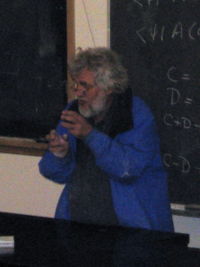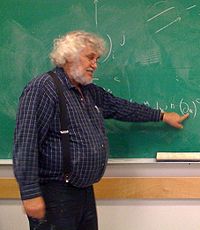
Bill Unruh
Encyclopedia


Physicist
A physicist is a scientist who studies or practices physics. Physicists study a wide range of physical phenomena in many branches of physics spanning all length scales: from sub-atomic particles of which all ordinary matter is made to the behavior of the material Universe as a whole...
at the University of British Columbia
University of British Columbia
The University of British Columbia is a public research university. UBC’s two main campuses are situated in Vancouver and in Kelowna in the Okanagan Valley...
, Vancouver
Vancouver
Vancouver is a coastal seaport city on the mainland of British Columbia, Canada. It is the hub of Greater Vancouver, which, with over 2.3 million residents, is the third most populous metropolitan area in the country,...
, who discovered the Unruh effect
Unruh effect
The Unruh effect , was first described by Stephen Fulling in 1973, Paul Davies in 1975 and Bill Unruh in 1976. It is the prediction that an accelerating observer will observe black-body radiation where an inertial observer would observe none...
. Unruh was born in Winnipeg
Winnipeg
Winnipeg is the capital and largest city of Manitoba, Canada, and is the primary municipality of the Winnipeg Capital Region, with more than half of Manitoba's population. It is located near the longitudinal centre of North America, at the confluence of the Red and Assiniboine Rivers .The name...
, Manitoba
Manitoba
Manitoba is a Canadian prairie province with an area of . The province has over 110,000 lakes and has a largely continental climate because of its flat topography. Agriculture, mostly concentrated in the fertile southern and western parts of the province, is vital to the province's economy; other...
. He obtained his B.Sc. from the University of Manitoba
University of Manitoba
The University of Manitoba , in Winnipeg, Manitoba, Canada, is the largest university in the province of Manitoba. It is Manitoba's most comprehensive and only research-intensive post-secondary educational institution. It was founded in 1877, making it Western Canada’s first university. It placed...
in 1967, followed by an M.A. (1969) and Ph.D. (1971) from Princeton University
Princeton University
Princeton University is a private research university located in Princeton, New Jersey, United States. The school is one of the eight universities of the Ivy League, and is one of the nine Colonial Colleges founded before the American Revolution....
, New Jersey
New Jersey
New Jersey is a state in the Northeastern and Middle Atlantic regions of the United States. , its population was 8,791,894. It is bordered on the north and east by the state of New York, on the southeast and south by the Atlantic Ocean, on the west by Pennsylvania and on the southwest by Delaware...
, under the directions of Professor John Archibald Wheeler
John Archibald Wheeler
John Archibald Wheeler was an American theoretical physicist who was largely responsible for reviving interest in general relativity in the United States after World War II. Wheeler also worked with Niels Bohr in explaining the basic principles behind nuclear fission...
.
Areas of research
Unruh has made seminal contributions to our understanding of gravity, black holes, cosmologyPhysical cosmology
Physical cosmology, as a branch of astronomy, is the study of the largest-scale structures and dynamics of the universe and is concerned with fundamental questions about its formation and evolution. For most of human history, it was a branch of metaphysics and religion...
, quantum fields in curved spaces, and the foundations of quantum mechanics, including the discovery of what is now known as the Unruh effect
Unruh effect
The Unruh effect , was first described by Stephen Fulling in 1973, Paul Davies in 1975 and Bill Unruh in 1976. It is the prediction that an accelerating observer will observe black-body radiation where an inertial observer would observe none...
.
Unruh also appears to be interested in music and teaches the Physics of Music.
The Unruh effect
The Unruh effect, which Unruh discovered in 1976, is the prediction that an accelerating observer will observe black-body radiation where an inertial observer would observe none. In other words, the accelerating observer will find himself or herself in a warm background. The quantum state which is seen as ground state for observers in inertial systems is seen as a thermodynamic equilibriumThermodynamic equilibrium
In thermodynamics, a thermodynamic system is said to be in thermodynamic equilibrium when it is in thermal equilibrium, mechanical equilibrium, radiative equilibrium, and chemical equilibrium. The word equilibrium means a state of balance...
for the uniformly accelerated observer. The Unruh effect therefore means that the very notion of vacuum
Vacuum
In everyday usage, vacuum is a volume of space that is essentially empty of matter, such that its gaseous pressure is much less than atmospheric pressure. The word comes from the Latin term for "empty". A perfect vacuum would be one with no particles in it at all, which is impossible to achieve in...
depends on the path of the observer through spacetime
Spacetime
In physics, spacetime is any mathematical model that combines space and time into a single continuum. Spacetime is usually interpreted with space as being three-dimensional and time playing the role of a fourth dimension that is of a different sort from the spatial dimensions...
.
The Unruh effect can be expressed in a simple equation giving the equivalent energy kT of a uniformly accelerating particle (with a being the constant acceleration), as:
Awards
- Rutherford Memorial MedalRutherford Memorial MedalThe Rutherford Memorial Medal is an award for research in the fields of physics and chemistry by the Royal Society of Canada. It was dedicated to the memorial of Ernest Rutherford.-Physics:* 2010 : Kari Dalnoki-Veress* 2009 : Barth Nettlefield...
of the Royal Society of CanadaRoyal Society of CanadaThe Royal Society of Canada , may also operate under the more descriptive name RSC: The Academies of Arts, Humanities and Sciences of Canada , is the oldest association of scientists and scholars in Canada...
, 1982 - Herzberg Medal of the Canadian Association of Physics, 1983
- Steacie Prize, 1984
- Steacie Fellowship, 1984–1986
- BC Science Council Gold Medal, 1990
- Appointed a Fellow of the Royal Society, July 13, 2001
Publications
- "Notes on Black Hole Evaporation", Phys. Rev. D 14, 870 (1976), W.G. Unruh.
- "Time and the Interpretation of Canonical Quantum Gravity", Phys. Rev. D 40, 2598 (1989), W.G. Unruh and R. Wald.
- "Reduction of a wave packet in quantum Brownian motion", Phys. Rev. D 40 1071, W.G. Unruh and W.H. Zurek.
- "An introduction to the Multi-Grid Method for Numerical Relativists", General Rel. & Grav. 18, 813 (1985), M. Choptuik and W.G. Unruh.
External links
- Royal Society ID Page
- University of British Columbia Physics Dept. page
- Rutherford Medal
- Unruh & Wald Fest (A Celebration of the Careers & 60th Birthdays of WG Unruh & RM Wald )
- Dr. Unruh's course webpage - PHYS 200 Introduction to Relativity and Quanta
- UBC Theoretical Physics Homepage - a web server ran by Unruh


